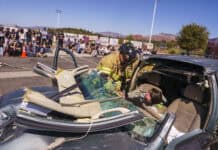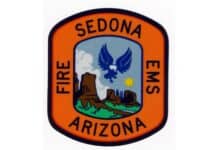
The Sedona Fire District will be working with the Arizona Burn Foundation to install free smoke alarms in the Sunset Mobile Home Park on Saturday, May 18, between 8:15 a.m. and noon and is looking for volunteers to assist 300 of their neighbors.
The community smoke alarm walk is in response to a structural fire in the mobile home park that killed an older female resident on the evening of March 12. The woman was extracted from her home and “later died at the hospital from smoke inhalation,” SFD Division Chief of Community Risk Reduction Dori Booth said. The cause of the fire was “ultimately found to be undetermined.”
“During the course of the investigation, we didn’t find any smoke alarms present in the home,” Booth said. “Then, as we were going through the investigation piece, multiple neighbors had mentioned that they didn’t have smoke alarms, or that they had previously removed them because they were beeping and couldn’t change the batteries.”

“Without a working smoke alarm, they ended up perishing,” CEO of Arizona Burn Foundation Rex Albright said. “So the fire [district] reached out to us to support an outreach effort to let people know the importance of having working smoke alarms, and the opportunity to educate a group of people since it’s relatively fresh in their minds that this has happened and it can happen, so let’s be prepared for it. So let’s do as best we can to get your home fire safe, that includes working smoke alarms, making sure you have an exit plan.”
“If you want to be a volunteer for the community installation day, we’ll show you how to do it,” Albright said. “It’s fairly simple. We take about 10 to 15 minutes per home, you talk to the resident and make sure that they know what you’re there for. You’re representing the Arizona Burn Foundation, also the SFD … The biggest part of the training is you have to know how to use a screwdriver, but you don’t have to use any other special tools. There’s no electrical involved, it’s a sealed battery system. You put two screws in a wall or into the ceiling and you spin on an alarm and push a button to make sure it works.”
Participants may have to use a two-step ladder to install the alarms, but volunteers are usually partnered with SFD personnel to assist with the process.
The Arizona Burn Foundation is an 501(c)(3) organization that works to improves the quality of life of burn survivors and their families in Arizona while promoting prevention and education for communities.
“Our main mission is to support burn survivors and their families in the hospital and then from there to offer programs to allow them to get reintegrated back into the community, and then the second part of our mission is to prevent the next fire or burn injury,” Albright said.
Since 2006, the organization has installed over 28,000 free smoke alarms across Arizona.
“Our standard alarm is a 10-year sealed unit,” Albright said. “They’re 10-year lithium batteries in [the alarm] so we ask you to check them every month … But after eight years, because in Arizona, it’s more dust than the longevity of the battery, that will start to make the sensors less sensitive, so we ask you, after eight years, to replace the whole unit and then [put] on a brand-new unit. There’s no maintenance issues as far as batteries go, but you do need to dust [the alarm] off every month.”
The Arizona Burn Foundation also works with community members to identify if residents have any special needs, such as hearing issues, and can install bed-shaking alarms instead.
Booth said that SFD considers the neighborhood “high risk” because it is composed of older, poorer residents.
“There’s a lot of electrical [work in that neighborhood] that’s not up to current code, but they were to code when they were originally built … a lot of them haven’t been upgraded to current code, which they wouldn’t be required to be,” Booth said. “But it’s also putting [alarms] in the population that might be on a fixed income or lowered income that doesn’t have the money to do voluntary renovations.”
“We’re going to do a whole education component along with installing free smoke alarms,” Albright said. “We will leave education resources on how to create an exit plan from your home. Then if you do have any kind of a loss in a fire, here’s your contacts to help you [find] housing, usually using American Red Cross as our backbone for that to help you find the resources to get you back on your feet again.”
“If you do have an older adult neighbor or family member, go and check on theirs as well, or mobility-impaired, anything that can prevent someone from taking care of themselves,” Booth said. “Community risk can be reduced by working together as a community and learning about what risks are present and being able to help neighbors out especially in times like these is critical.”
The meetup will include a free breakfast. Details will be provided when participants sign up, and they may do so online at azburn.org or by contacting christina.cornils@azburn.org. Questions may be directed to the Arizona Burn Foundation at (602) 230-2041.




















